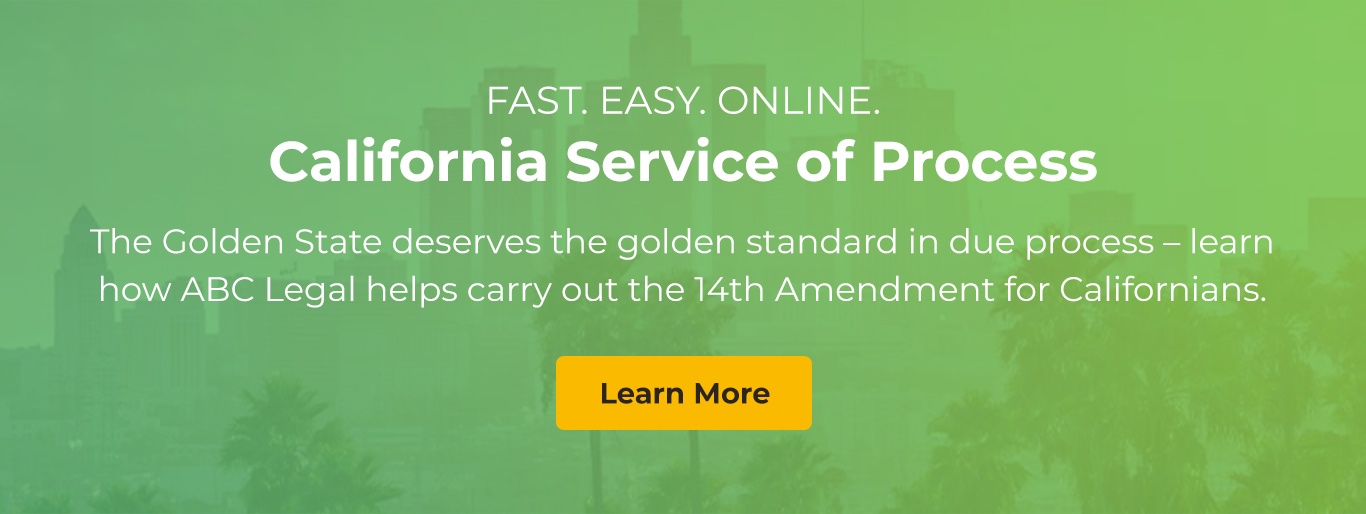With nearly 40 million people, California is the most populous state in the country. As such, it should come as no surprise that it also possesses the nation’s largest court system. According to the Judicial Branch of California, the state’s legal system serves nearly 12% of the total United States population through more than 500 court buildings located across the state’s 58 counties. For the fiscal year of 2018 to 2019, nearly 220,000 civil lawsuits seeking damages of at least $25,000 were filed in California courts. Lawsuits seeking less than $25,000 in damages clocked in at more than 485,000.
It’s important that law firms, legal practitioners, plaintiffs, defendants, and process servers have a clear understanding of service of process in California. The failure to follow standards for serving process can lead to delays and could delay or potentially derail a lawsuit altogether. With that in mind, let’s look at how to serve process under California law.
 Who Can Serve Process In California?
Who Can Serve Process In California?
Before an individual or company can be served with legal papers, it’s important to understand who can actually carry out the duties of a process server under the California Code of Civil Procedure. According to the Judicial Branch of California, process servers in California can be drawn from a wide pool of individuals, including:
- Friends and relatives
- Coworkers
- A county sheriff or marshal
- Professional process servers
There are some additional restrictions when it comes to serving process. In every situation, a process server in California is required to be at least 18 years of age. In addition, a process server cannot be a party to the case. This means if you are the plaintiff, then you cannot serve the defendant legal papers yourself. Similarly, a defendant cannot personally deliver a response to the plaintiff. Always use a disinterested third party when serving legal documents.
However, this only applies to a person performing a handful of services of process. California outlines strict regulations regarding process servers who are true professionals – those who consider it their occupation and regularly delivery legal documents. Examples of these restrictions can be found in the state’s Business and Professions Code, which is made up of a variety of laws that govern how various professionals are supposed to perform their duties.
Types Of Service Of Process In California
There are several ways to serve process in California, including:
Personal Service
This approach is what springs to most people’s minds when they think of process servers: the process server personally hands the documents over to the person being served. This action can take place at a person’s home, place of work, or in a public setting. The process server needs to inform the person being served that they are receiving court documents. Whether the party being served actually takes the documents in hand or simply chooses to walk away when presented with the documents is of no consequence. The service will still be considered valid. The process server must complete a proof of service document, detailing how and when the documents were delivered. This proof of service must be signed and filed with the court.
Personal service is the best way to ensure service of process has been effectively carried out. There is no doubt that the person being served is aware of the documents, and the process server can testify to physical delivery. Personal service is considered valid in all types of cases. Often, personal service is a requirement when the first documents are being delivered as part of a lawsuit.
 Substituted Service
Substituted Service
If attempts at making personal service have failed, then substituted service, where documents are left with someone other than the party named in the lawsuit might be necessary. This option is available only when a process server has already made multiple attempts (usually at least three attempts) to serve documents in person. As guidance pertaining to the California Code of Civil Procedures notes, these attempts also must reflect genuine effort to reach the party: The server should be making attempts on different days and at different times of day during a period when the likelihood of encountering the person being served is high.
When all reasonable attempts at making personal service have been exhausted, then the documents may be left with a person who is at least 18 years of age and is living at the defendant’s home. If personal service is being attempted at the party’s place of employment, then the documents can be left with someone who appears to have workplace authority and is at least 18 years old. The process server needs to inform this person that the papers are legal documents intended for the party.
In addition, the process server must mail copies of the documents to the address where the substituted service was carried out. The process server must also complete a declaration of due diligence and sign the declaration under penalty of perjury. This type of service is not considered as reliable as personal service. It can be easy to raise questions about whether the defendant actually received the documents.
Service by mail
Sometimes hand delivery to the party or an appropriate substitute just isn’t possible. In these instances, the next option to explore is whether service by mail is acceptable under local regulations. Even though the process doesn’t involve meeting face-to-face, the person who is mailing the legal documents must nonetheless be a disinterested third party. Papers may be sent to a person’s home address or mailing address of record.
As with personal service, the process server will need to complete a proof of service that will then be filed with the court. Guidance notes that service by mail is considered complete five days after the documents have been mailed. Although convenient, service by mail is less than ideal. Similar to the issues that can surround substituted service, it’s easy to question whether the person actually received the legal documents.
There are many other methods of service that may suffice, depending on the nature of the lawsuit, including service by publication and service by posting at the courthouse. Always make sure any type of service other than personal service is allowed in your particular case.
ABC Legal Can Help With Service Of Process In California
Delivering effective service of process in California can be complicated. ABC Legal helps to simplify this necessary component of legal proceedings by providing experienced, knowledgeable California process servers. Never worry about whether service will comply with local regulations again. ABC Legal validates each serve, so you can always feel confident that proof of service is accurate and will hold up in court.
Law firms, legal practitioners, and others choose ABC Legal for reliability, fast service, and timely communications. We invite you to start a conversation with us today and find out how we can meet all of your service of process needs.
The information above does not constitute legal advice and is for general, informational use. Due to the changeability of laws, the information on this page may not reflect the most recent local laws. Always consult current legal and civil codes in your area for the most accurate information.

Written by
Todd HarrisonService made simple—down the road and across the country. Join the 50,000+ professionals who trust ABC Legal for service of process.
Recent Posts
Subscribe to email updates
Popular posts
Learn More

Covid Court Updates: Orange County, California

RideShare Companies Score a Win in California
.jpg?width=1254&height=836&name=iStock-1180489419%20(1).jpg)








